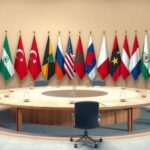Trump’s Return to Golf: Bridging LIV Golf and the PGA Tour
President Trump is focused on uniting LIV Golf and the PGA Tour, reflecting both his affinity for golf and his ties to Saudi Arabia. His administration has already sought to mediate negotiations between the two entities, acknowledging the strategic importance of the Saudi relationship. Amid concerns over ethics and international policy, these developments signify a unique blend of sports and diplomacy.
In a notable re-engagement with the world of professional golf, President Donald Trump is attempting to bridge the gap between LIV Golf and the PGA Tour, with the aim of ending their ongoing conflict. This effort follows previous negotiations, including a call facilitated by the White House in February to discuss potential cooperation between the two tours. The context suggests that Trump’s interest in resolving these disputes is more intense than his engagement in other pressing global issues.
President Trump’s attachment to golf is well-documented, with ownership of several golf courses and friendships with golfing icons like Tiger Woods and Jack Nicklaus. His interactions with key figures from both the PGA and LIV Golf, particularly during a tournament hosted at his Doral estate, further underline his commitment. The LIV tournament is set to be aired on Fox Sports, denoting an ambitious crossover between sports and media.
The relationship between Trump and Saudi Arabia is also significant, as the kingdom has long invested in Trump’s ventures. Trump articulated the importance of Saudi investments, highlighting their potential to generate jobs in the United States. While implementing tariffs on many imports, he has spared Saudi products, indicating a special consideration for the relationship.
Experts caution that Trump’s ties to Saudi leaders, particularly in light of previous controversies regarding the assassination of journalist Jamal Khashoggi, raise ethical concerns. Comments from congressional representatives underline the discomfort surrounding Trump’s affinity towards the Saudi regime and its implications for U.S. foreign policy.
In conjunction with his personal interactions, the White House maintains that Trump’s approach to Saudi Arabia is beneficial for U.S. security and economic interests. The Trump Organization asserts that the president is not directly involved in business matters while serving in office, although the intersection of golf and business continues to pose challenges.
The LIV Golf tour, backed by the Saudi Public Investment Fund, poses a formidable challenge to the PGA Tour by attracting top talent and disrupting traditional norms within the sport. As both tours vie for talent and audience engagement, a potential partnership could result in significant financial investments and changes to the golf ecosystem.
Despite mixed outcomes in negotiations thus far, Trump’s reputation as a dealmaker fuels optimism for future agreements. Previous attempts at fostering dialogue have yielded no solid agreements, but the involvement of Trump lends credibility to the revival discussions, with the aim to unify the game of golf.
The compatibility of Trump’s negotiation style with Arab leaders—characterized by directness and minimal bureaucratic constraints—has been noted as a factor in building alliances. As golf remains entangled in political maneuvering, the outcomes of these negotiations will significantly shape the sport’s future landscape, reflecting broader themes of diplomacy and international relations.
In summary, President Donald Trump’s endeavors to mediate between LIV Golf and the PGA Tour signify a unique convergence of sport and politics, driven by his personal interests in golf and financial ties to Saudi Arabia. While the pursuit of a unified tour faces several challenges, Trump’s direct negotiation style could potentially foster a resolution to the existing conflicts. Nonetheless, this intersection raises important ethical considerations, highlighting the complexities surrounding Trump’s relationships with powerful foreign entities and their implications for American policies.
Original Source: www.washingtonpost.com








Post Comment